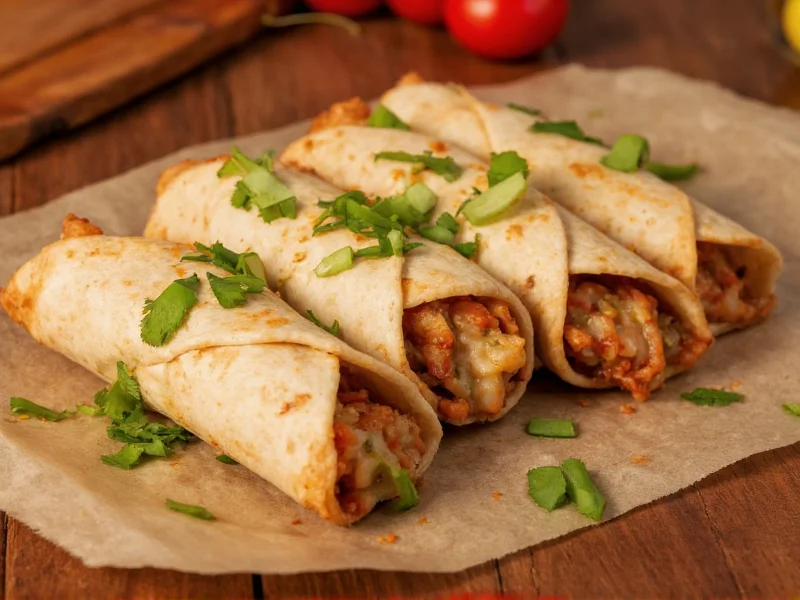Understanding Mole: The Heart of the Dish
Mole (pronounced moh-lay, not mole like the animal) represents one of Mexico's most sophisticated culinary achievements. This complex sauce traces its origins to pre-Hispanic Mexico, with documented recipes dating back to the 17th century. Traditional mole poblano—the variety most commonly used in mole burritos—contains up to 20 ingredients including:
| Core Components | Common Ingredients | Flavor Contribution |
|---|---|---|
| Chili Base | Ancho, pasilla, mulato peppers | Deep, smoky foundation with varying heat levels |
| Thickening Agents | Almonds, sesame seeds, tortillas | Creamy texture and nutty undertones |
| Flavor Enhancers | Cinnamon, cloves, garlic, onions | Warm spice notes and aromatic complexity |
| Signature Element | Unsweetened chocolate | Richness and subtle sweetness without being dessert-like |
Authentic mole requires hours of preparation, involving toasting, grinding, and slow simmering to develop its signature depth. While traditional mole poblano serves turkey or chicken, the burrito adaptation creatively incorporates this sauce into handheld format.
What Makes a Burrito a Mole Burrito?
The critical distinction between a standard burrito and a mole burrito lies in the sauce integration. While regular burritos might include salsa or guacamole, mole burritos feature the sauce as a primary component—not merely a condiment. Chefs typically:
- Prepare or source authentic mole sauce (homemade or quality commercial)
- Apply the sauce liberally to the filling ingredients before wrapping
- Serve additional warm mole on the side for dipping
- Avoid competing sauces that would overwhelm mole's delicate balance
Traditional fillings complement rather than compete with the mole. Shredded chicken or turkey works best as the protein base, though vegetarian versions often feature mushrooms or roasted vegetables. The sauce's complexity means simpler accompaniments like white rice and black beans allow the mole to shine.
Authenticity Considerations for Mole Burritos
Food historians note that mole burritos represent a creative fusion rather than a traditional Mexican dish. In Mexico, mole typically serves as a standalone saucy dish over poultry, not as a burrito component. The burrito format itself originated in Northern Mexico and California, making the combination a delicious example of culinary evolution.
When evaluating authentic mole burrito preparation, consider these markers:
- Sauce quality: Uses properly balanced mole rather than simplified "mole-style" sauces
- Construction: Sauce integrates with fillings rather than merely topping the finished burrito
- Flavor balance: Chocolate notes enhance rather than dominate the profile
- Accompaniments: Served with traditional sides like Mexican rice rather than competing flavors
Many restaurants outside Mexico simplify the sauce significantly, sometimes substituting mole powder mixes or creating "mole-inspired" sauces that lack authentic complexity. True mole burritos maintain respect for the sauce's heritage while adapting it to handheld format.
Creating Mole Burritos at Home: Practical Approach
While authentic mole preparation requires significant time, home cooks can create satisfying mole burritos using these methods:
Option 1: Simplified Homemade Mole
This streamlined version maintains essential elements while reducing preparation time:
- Toast 3 dried ancho peppers (stemmed and seeded) in a dry skillet until fragrant
- Blend peppers with 1 cup chicken broth, 2 tbsp unsweetened cocoa, 1 tsp cinnamon, and 1 clove garlic
- Simmer mixture for 20 minutes, then strain for smooth texture
- Add shredded cooked chicken and simmer 10 more minutes
Option 2: Quality Commercial Shortcut
When time is limited, select mole products carefully:
- Look for "mole poblano" on packaging (avoid "mole negro" which is Oaxacan and stronger)
- Check ingredients for chocolate/cocoa content (should appear in first 5 ingredients)
- Avoid products listing "mole seasoning" as primary ingredient
- Enhance store-bought mole with toasted sesame seeds and a pinch of cinnamon
For the complete burrito assembly, spread warm flour tortillas with refried beans, add mole-coated protein, include minimal rice, and wrap tightly. The sauce should permeate the filling rather than merely coat the exterior.
Serving Suggestions for Authentic Experience
Mexican culinary tradition emphasizes balance in flavors and textures. Complement your mole burritos with:
- Traditional sides: Mexican red rice, charro beans, or simple black beans
- Fresh elements: Thinly sliced radishes or quick-pickled red onions
- Creamy contrast: A small dollop of Mexican crema (not sour cream)
- Beverage pairing: A light Mexican lager or agua de jamaica (hibiscus tea)
Avoid competing flavors like guacamole or strong salsas that would overwhelm the mole's complexity. The sauce itself provides sufficient richness, so additional fats like cheese or excessive crema diminish the authentic experience.
Common Misconceptions About Mole Burritos
Several misunderstandings persist about this dish:
- Misconception: Mole contains ground mole animals
Reality: The word comes from molli (Nahuatl for sauce or concoction) - Misconception: All mole is extremely spicy
Reality: Authentic mole poblano has mild heat balanced by chocolate and spices - Misconception: Mole burritos are traditional street food in Mexico
Reality: They represent a creative fusion popularized in Mexican-American cuisine - Misconception: Any chocolate makes it mole
Reality: Authentic mole uses unsweetened chocolate/cocoa as flavor enhancer, not sweetener
Understanding these distinctions helps appreciate mole burritos as a thoughtful adaptation of traditional elements rather than an authentic historical dish.
Exploring Variations: Making Mole Burritos Your Own
While respecting traditional elements, creative adaptations can make mole burritos accessible to various dietary preferences:
- Vegetarian mole burrito: Substitute mushrooms or roasted sweet potatoes for meat, using vegetable broth in the sauce
- Lighter version: Use turkey instead of chicken and reduce oil in sauce preparation
- Breakfast adaptation: Incorporate mole into scrambled eggs with minimal sauce quantity
- Regional twist: Add a touch of California avocado without overwhelming the mole profile
The key to successful variations remains maintaining mole's essential flavor balance—sweet, savory, spicy, and nutty elements should coexist harmoniously rather than having one dominate.











 浙公网安备
33010002000092号
浙公网安备
33010002000092号 浙B2-20120091-4
浙B2-20120091-4